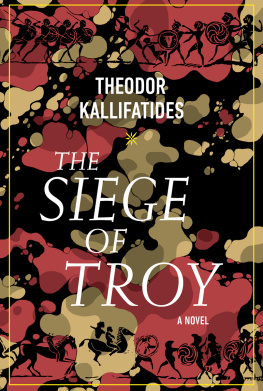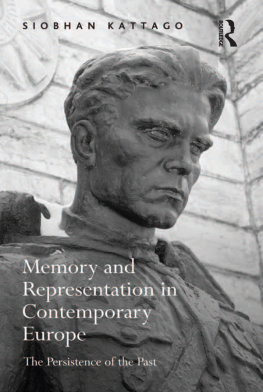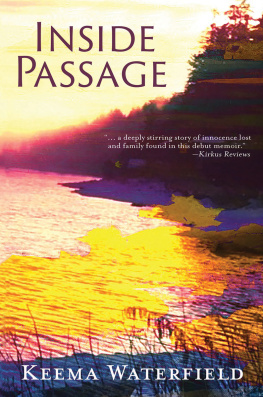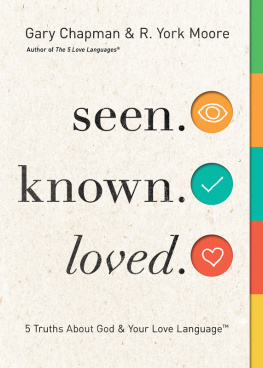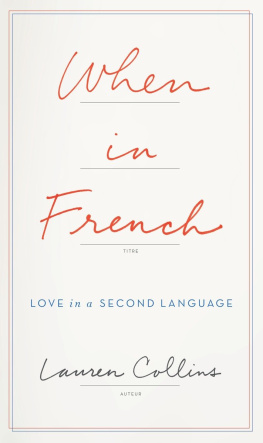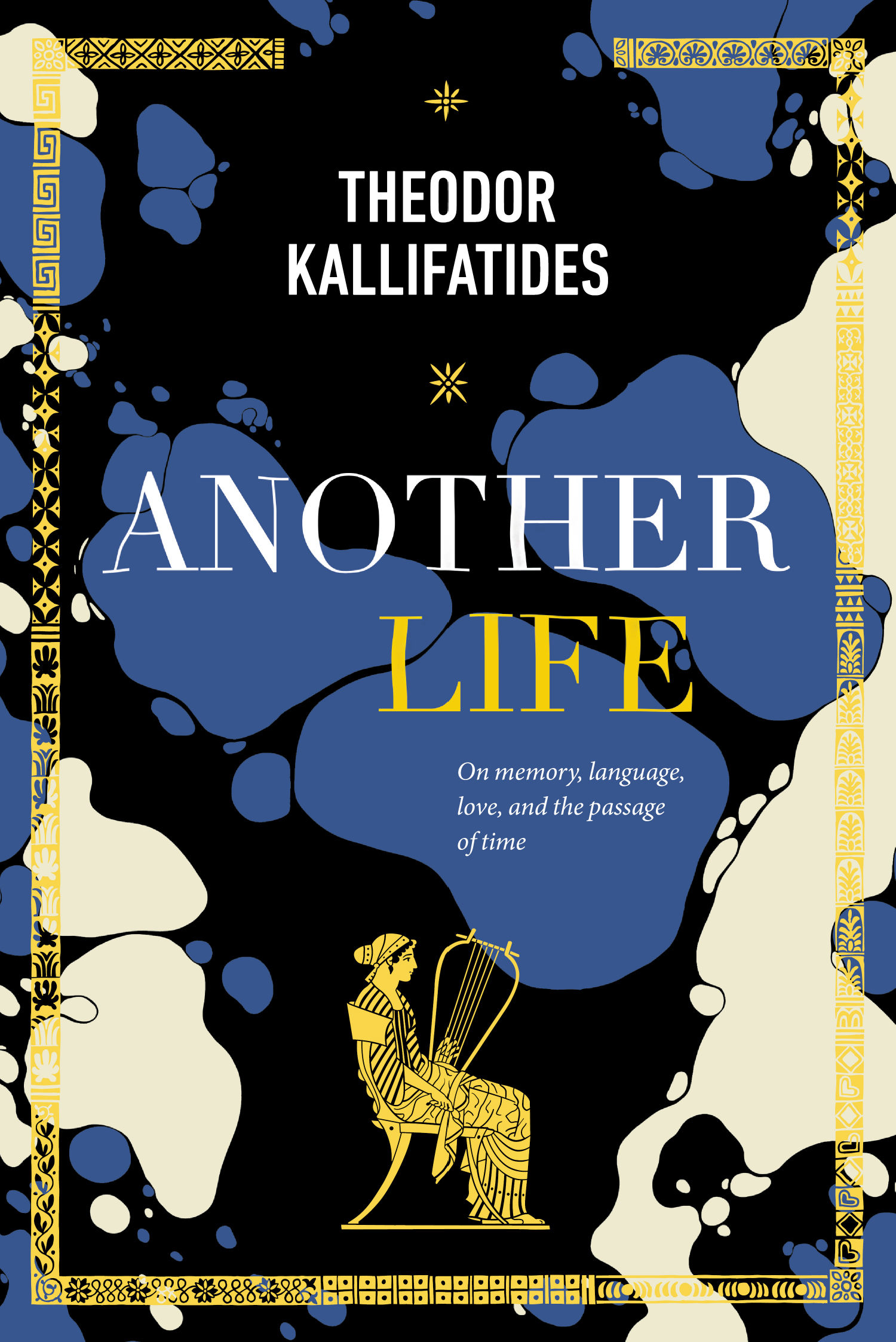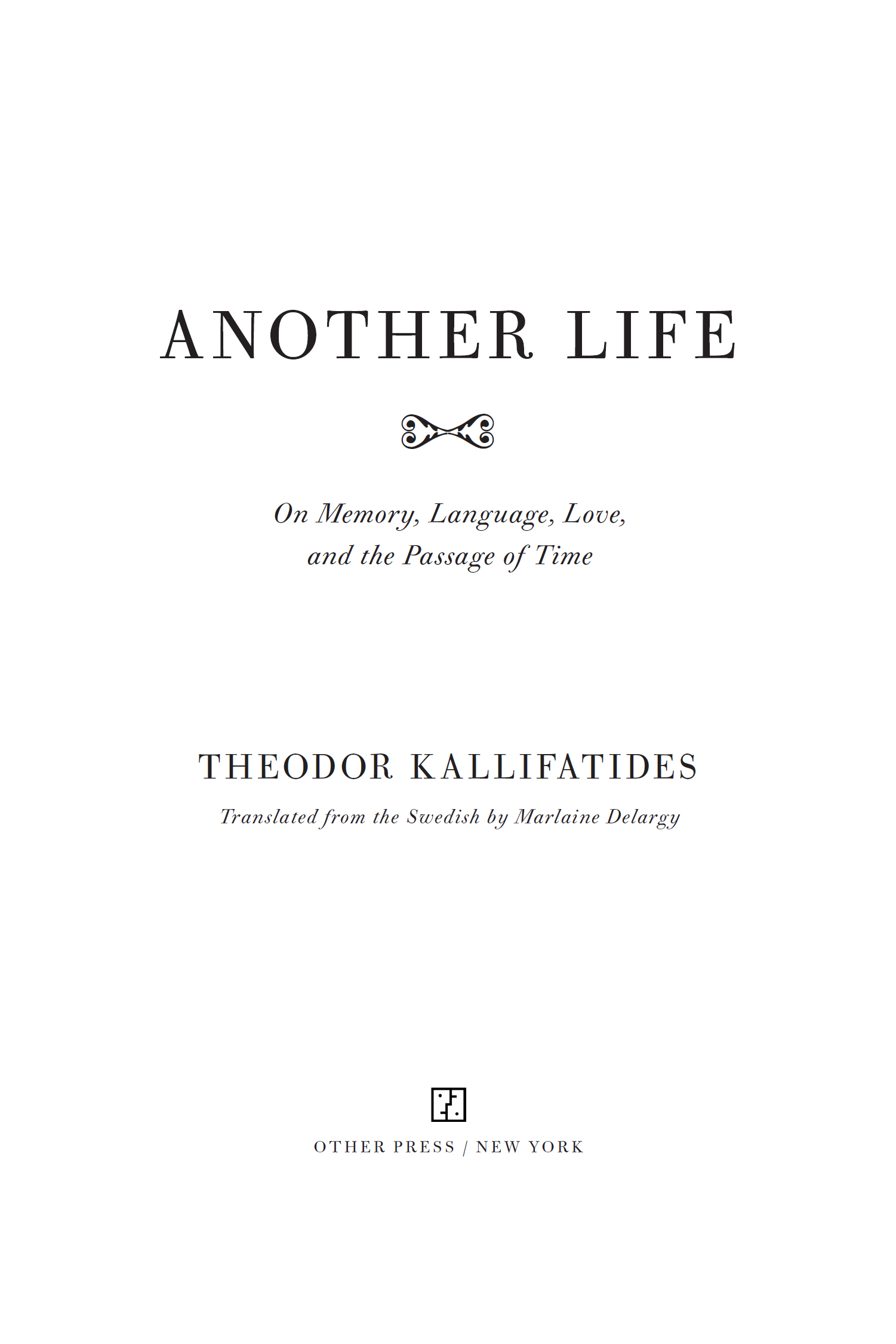Contents
Copyright 2017 Theodor Kallifatides
Originally published in Swedish as nnu ett liv in 2017 by Albert Bonniers Frlag, Stockholm
Translation copyright 2018 Other Press
Verse on from The Persians by Aeschylus, translated by Robert Potter.
Reprinted by permission.
Production editor: Yvonne E. Crdenas
Text designer: Jennifer Daddio / Bookmark Design & Media Inc.
by Alpha Design & Composition of Pittsfield NH.
All rights reserved. No part of this publication may be reproduced or transmitted in any form or by any means, electronic or mechanical, including photocopying, recording, or by any information storage and retrieval system, without written permission from Other Press LLC, except in the case of brief quotations in reviews for inclusion in a magazine, newspaper, or broadcast. For information write to Other Press LLC, 267 Fifth Avenue, 6th Floor, New York, NY 10016.
Or visit our Web site: www.otherpress.com
The Library of Congress has cataloged the printed edition as follows:
Names: Kallifatides, Theodor, 1938- author. | Delargy, Marlaine, translator.
Title: Another life : on memory, language, love, and the passage of time / Theodor Kallifatides; translated from the Swedish by Marlaine Delargy.
Other titles: nnu ett liv. English
Description: New York : Other Press, [2018] | Originally published in Swedish as nnu ett liv in 2017 by Albert Bonniers Frlag, StockholmECIP galley Identifiers: LCCN 2017058667 (print) | LCCN 2018006806 (ebook) | ISBN 9781590519462 (ebook) | ISBN 9781590519455
Subjects: LCSH: Kallifatides, Theodor, 1938 | Authors, Swedish20th centuryBiography.
Classification: LCC PT9876.21.A45 (ebook) | LCC PT9876.21.A45 A5613 2018
(print) | DDC 839.73/74 [B]dc23
LC record available at https://lccn.loc.gov/2017058667
Ebook ISBN9781590519462
v5.3.2
a
Nothing is more precious than a friend.
Aristotle
Contents
I
It was a difficult time. My latest novel had taken up all my strength. I was exhausted, and thinking of abandoning my writing: giving up on it, before it gave up on me.
I was already on overtime, having completed my seventy-seventh year. One evening in the Folkoperan bar, the subject came up when I was chatting with Bjrn Wiman, the culture editor of Dagens Nyheter. He put forward the view that nobody should write after the age of seventy-five.
Its okay until seventy-five, but then something happens to them, he said. He meant writers.
Had this something happened to me now?
I made a couple of halfhearted attempts to work on a few ideas, but got nowhere. Partway through a sentence I would be overcome by a feeling of weariness, the words didnt taste right in my mouth. How to move on?
On one of those days I went and stood under the shower in my studio with all my clothes on and let myself get absolutely soaking wet. The idea was to try out Chekhovs advice on how to recover from a failure. That was what it felt like: not being able to write was a major failure, a huge failure, and the unassuming Anton had suggested that one should do what a wet dog does. Shake off the water.
It didnt work. Quite the reverse. I ended up trembling with cold, and the sorrow burrowed even deeper into my soul. I was not only a wet dog but also a frozen ex-writer.
I had lived for seventy-seven years. The time weighed heavier than the water. It wasnt possible to lift that weight from my shoulders. How was I going to be able to write again?
I had read an interview with Karin Johannisson, one of the finest essayists we have ever had. She was only seventy, but she said she wasnt going to write anymore, because she had neither the strength nor the desire to be eaten up by a new literary project to that extent.
It didnt bear thinking about.
Was it still possible for me to organize my days around a text? The narrative filled every waking and sleeping moment when I was working. My heroines were close to me, and my heroes, who lay beside them, had to put up with my scorn or loathing if they were cowardly or cruel.
My heroines aroused boundless curiosity and desire. They walked before me or arm in arm with me, they came toward me scowling or smiling, they sat opposite me with their legs crossed, or giggled behind my back.
I knew how they dressed, what they read, what they liked in a man or in a woman, when they fell in love, and when they opened their arms for the first time.
Sometimes I would fall in love with one of them, and jealousy took over. Intense interrogation, over and over again. What did you say to him and what did he say to you? Where have you been? You call that dancing? It looked more like foreplay to me! What are you thinking about? I called and you didnt answer. And so on and so on.
In the evenings, my wife would occasionally ask, What did you do today?
Ive been with another woman.
She would laugh, but it was true. I was with Elena from With the Coolness of Her Lips in Australia or with Timandra in Athens two thousand five hundred years ago or with someone else somewhere else.
That was how my days had passed ever since 1969, when my first novel was published. No writers block, no interruptions to the flow. Every book was a bridge to the next. Almost like love affairs. But now it was 2015, and my strength was dwindling. Did I have the energy to summon up the dedication and commitment that had carried me all these years?
My greatest fear has always been that I might leave myself open to ridicule. Write something so dire that even the gulls flying over Strmmen would snigger. I was more afraid of writing badly than not writing at all. But would I know if it was bad? Or would I terrorize my wise publisher?
One can always rely on the critics, of course. I couldnt. I had been part of the literary game of Ludo for far too long to take it entirely seriously. The decision to write or not to write was too important to allow someone else to make it for me.
This was about my life.
Aksel Sandemosewho spelled his name with ks because he didnt want a cross in the middle of itis a writer who has won my heart and my mind. He used to say that if an author can stop writing, then he should.
Sandemose had another piece of advice. One of his close friends was a painter who had lost his beloved wife and was bemoaning the fact that he could no longer paint.
Every time I stand in front of my easel, I see her face, his friend said.
Well, paint her face, Sandemose replied.
I didnt have a face to paint, just a dull feeling of anxiety in my heart, an inarticulacy in my brain as if it were wrapped in cotton wool, a kind of permanent hangover. I might be able to write about why I couldnt write, but it wasnt exactly a pressing need. It would be better to stop.
Could I stop? I wasnt sure. Not being able to write is one thing. Deciding to stop trying is something quite different. When I mentioned it to my family, they just laughed and reminded me that I said the same at the end of every book. A couple of friends reacted in the same way. Typical addictive behavior, one of them said. Every time you get clean you decide to stop, then you go straight back to your drug of choice.
Although sometimes its just not possible to write. Even an author as gifted as Gran Tunstrm had to abandon a manuscript in the middle of his work, because he simply couldnt write another line. Or a major author like Vilhelm Moberg, who chose death rather than artistic impotence.


